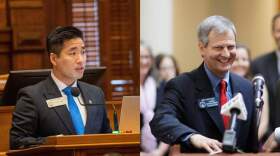Oklahoma Sen. David Bullard (R-Durant) invited health care providers from his hometown and beyond to discuss the state’s transition to managed Medicaid, or SoonerSelect. They said the transition has been a disaster for providers and patients across the state.
What is managed care?
The Oklahoma Health Care Authority (OHCA) began its transition to SoonerSelect in 2022 after Gov. Kevin Stitt signed Senate Bill 1337 and Senate Bill 1396.
SB 1337 required OHCA to enter capitated contracts with entities to deliver Medicaid services. It left out the state’s aged, blind and disabled populations, meaning they will still be served under the OHCA-led Medicaid program, SoonerCare.
OHCA oversees Oklahoma’s Medicaid program. Three managed care organizations now coordinate the state’s medical Medicaid care — Humana Healthy Horizons, Aetna Better Health and Oklahoma Complete Health, which also runs Oklahoma’s Children Specialty Program — and two entities coordinate dental care, Liberty Dental Plan of Oklahoma and DentaQuest
The transition for medical plans went live April 1, and while the agency touts its benefits, some providers have experienced challenges.
SB 1396 added to an already existing Supplemental Hospital Offset Payment Program, intending to ease the transition for providers by taxing hospitals and using collected fees to attract more federal money. That total is redistributed to participating hospitals. The bill brought an opportunity to invest additional funding into hospitals, and they received an accelerated payment of $252.4 million in April.
Since those bills were signed, OHCA has been working to make providers and members aware of the transition through things like newsletters, social media posts, town halls and provider meetings.
SoonerSelect health plan enrollment began Feb. 1 and ended March 10, and if members didn’t actively choose a plan, OHCA enrolled them in one on their behalf. OHCA Public Information Officer Emily Long said at the end of open enrollment, about 20% of Oklahomans had actively chosen a plan.
What did providers have to say Wednesday?
Bullard said he decided to hold the press conference after receiving emails and calls from providers voicing concerns about the transition.
Durant sits near the Texas border with a population of about 20,000 people. Bullard and the providers from his hometown said the challenges presented by managed care are particularly affecting rural areas like theirs.
“Rural Oklahoma has especially more challenges because we do have sort of a health care scarcity, but this isn't helping attract physicians,” said Durant pediatrician Dr. Michael Simulescu, whose practice serves 75% Medicaid recipients.
One of the main challenges includes getting paid, said Dr. Kinion Whittington, an obstetrician-gynecologist in Durant. He said two months into the transition, he has received about $2,200 in claims. He completed 42 deliveries last month.
“I want to propose a question. Do you know any businesses that would stay open for two or three months serving people and not receiving payment and are unsure if they will ever see payment or when it will occur? They close pretty rapidly,” Whittington said. “The providers in our communities are providers, service providers. We’re not businesses. They are currently providing services for free to people in need and will probably continue until they can’t.”
Oklahoma State Medicaid Director Traylor Rains told StateImpact the state’s contract requires the insurance companies to pay 90% of all clean claims in 14 calendar days. Whittington said the turnaround for his practice for claims before the transition was three days.
A “clean claim” is one that has no defects, like incomplete documentation. Such errors can delay timely payment.
Other providers in the state shared similar experiences with StateImpact, including Amanda Paul, a speech-language pathologist in Chickasha who said at the end of May, she received half of her checks from April from two of the plans, and one plan provided some checks from May.
Her challenges stemmed from getting her claims for one of the plans through the online provider portal, Availity, and problems billing correctly for another. She said those issues took a lot of late nights to figure out, and she considered closing down while serving most clients for free.
OHCA’s Emily Long said in an email the plans have paid more than 1.3 million medical claims totaling nearly $230 million to providers since April 1.
She also said an additional $100 million will be distributed to Oklahoma providers, including physicians, mid-level practitioners and behavioral health providers annually through a new provider payment program incentivizing early intervention behavioral health screenings, after-hours access to services and well visits.
“This program aligns with the state’s directive that 11% of SoonerSelect medical spending be toward primary and preventive care services within 4 years,” Long said.
Bullard said the goal of the press conference was to call attention to the impacts the transition is having on providers and patients across the state.
“Governments have a bad tendency to wait until we are in crisis mode before they act. My goal is to get us into action before we hit crisis mode,” Bullard said.
Long said OHCA has worked diligently to ensure the transition is as smooth as possible for members and providers.
“Throughout SoonerSelect implementation, OHCA has kept its responsibility as a protector of public trust at the forefront,” Long said. “OHCA remains committed to holding each (contracted entity) accountable to ensure compliance with state, federal, and contractual obligations, prioritizing the well-being of our members and providers.”
Additional Resources:
- Oklahomans have until the end of June to change their plans. They can call 800-987-7767, option 5 to talk with choice counselors.
- OHCA SoonerSelect Contact: SoonerSelect@okhca.org
- Provider resources are available on OHCA’s website
- Member resources are available on OHCA’s website
- Plans are offering advance or interim payments to providers experiencing cash flow issues.
StateImpact Oklahoma is a partnership of Oklahoma’s public radio stations which relies on contributions from readers and listeners to fulfill its mission of public service to Oklahoma and beyond. Donate online.







